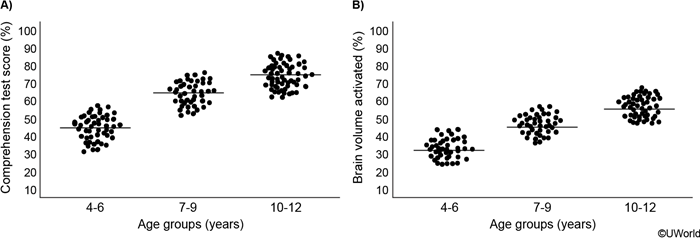Passage
Language is a skill acquired during early childhood that continues to develop for many years. Communication using language involves multiple complex processes, including listening, speaking, comprehension, and cognition. Receptive language ("language input") involves language comprehension, while expressive language ("language output") involves the ability to produce intelligible language. In normally developing children, receptive language emerges first, followed by expressive language.To examine how age plays a role in the activation of the neurological networks involved in processing more complex language, researchers used functional magnetic resonance imaging (fMRI) to analyze how the use of receptive language generates metabolic activity in the brains of children. A total of 672 participants were divided into three groups by age: Age 4-6 (n = 219) , age 7-9 (n = 224) , and age 10-12 (n = 229) .Participants in each group were asked to listen to pre-recorded stories while undergoing fMRI of the brain to determine if an age-related difference could be found in activated brain tissue volume during the listening task. The recorded fMRI-monitored listening portion of the experiment lasted approximately 5 minutes. Immediately following this listening exercise, fMRI monitoring was discontinued and the children were administered tests to determine comprehension of the material. None of the children had been informed that they would be taking a comprehension test prior to its actual administration.
 Figure 1 fMRI listening task analyzed per age group: (A) comprehension test scores, and (B) brain volume activated (Note: Solid lines represent the mean in each group.)
Figure 1 fMRI listening task analyzed per age group: (A) comprehension test scores, and (B) brain volume activated (Note: Solid lines represent the mean in each group.)
M. M. Berl, E. S. Duke, J. Mayo, L. R. Rosenberger, E. N. Moore, J. VanMeter, N. Bernstein Ratner, C. J. Vaidya, and W. D. Gaillard ©2010 by Elsevier, Inc.
-A proponent of the universalism perspective would state that the results in Figure 1B support the belief that:
A) cognition is influenced by language.
B) cognition is required for language.
C) language and cognition develop via social interaction.
D) language is necessary for cognition.
Correct Answer:
Verified
Q22: Passage
Lucid dreaming occurs when a person becomes
Q23: Passage
Poverty may be the most foundational risk
Q24: Passage
Lucid dreaming occurs when a person becomes
Q25: Passage
Lucid dreaming occurs when a person becomes
Q26: Passage
Of the biological factors impacting color perception
Q28: Passage
Of the biological factors impacting color perception
Q29: Passage
Language is a skill acquired during early
Q30: Passage
Language is a skill acquired during early
Q31: Passage
Of the biological factors impacting color perception
Q32: Passage
Language is a skill acquired during early
Unlock this Answer For Free Now!
View this answer and more for free by performing one of the following actions

Scan the QR code to install the App and get 2 free unlocks

Unlock quizzes for free by uploading documents